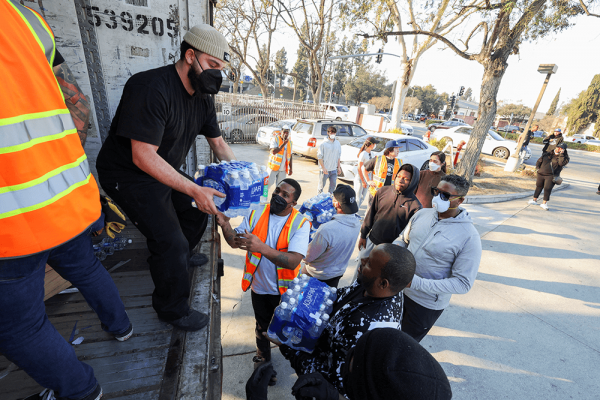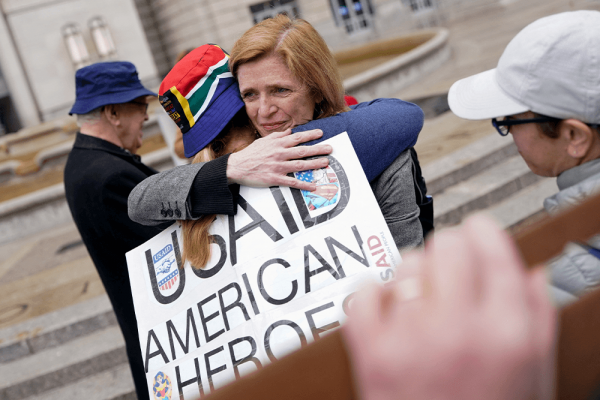ENUGU, NIGERIA — If you were to talk to many people locked up in a Nigerian jail, you'd likely hear a story similar to Cynthia Ukolie's: According to Ukolie, her boyfriend Chigozie Nelson was accused of stealing a cellphone belonging to his neighbor in November 2016. Although Ukolie disputes the allegation, Nelson was arrested and kept in police detention at New Haven Police station in Enugu for seven days. To secure his bail, Ukolie made a cash payment of 10,000 naira ($28). After collecting the money, the police asked her to get a surety. When she couldn’t secure one, her boyfriend was transferred in an unmarked vehicle to the Special Anti-Robbery Squad, SARS — a unit of the Nigerian police force that has received scrutiny for arbitrary arrests, extortion, and illegal detention.
Even though Ukolie had no connection to the alleged crime, upon arrival at the SARS facility in New Market, officers locked both Ukolie and her boyfriend into individual cells. Ukolie was 22 years old at the time. She explained to Sojourners how the officers later brought them each out for interrogation. A police officer collected her statement.
According to Ukolie, each time she said something different from what the police officer wanted written in the statement book, he interrupted her, telling her what to say instead.
“He wrote in the statement that my boyfriend gave me the phone,” she said. “He threatened me to sign and I did.”
In the end, the officers labeled Ukolie as an accomplice. She was arraigned in court with Nelson after spending 72 hours in another detention facility.
When they arrived at the court for prosecution, the police told them to plead guilty if questioned by the judge.
“The police prosecutor told us to plead guilty so we could be locked up in a better prison facility with limited duration before we get bail,” she said. “He said the awaiting trial inmate’s facility isn’t a good place to be — that we may languish there.”
For more than a decade, reform of Nigeria’s congested prisons has stalled, becoming a perennial problem for successive governments. Courts are bogged down with a huge backlog of cases, delaying the delivery of justice. Corruption among judicial officers only makes matters worse inside the prisons. Separately, large numbers of people serve excessive time in pretrial detention. Nearly 72.5 percent of the prison population is awaiting trial, according to data spanning the years of 2011 to 2015 from Nigeria’s National Bureau of Statistics.
However, at the federal level, there seems to be some progress in reforming the country’s prison system.
On Aug. 14, President Muhammadu Buhari signed a law changing the Nigerian Prisons Service to the Nigerian Correctional Service, suggesting a shift away from the common perception of prisons as places of torture and neglect. A presidential committee on prison reform and rehabilitation has been touring the country, releasing thousands of inmates to decongest prisons, and working to see how regional services can be improved. However, Isa Sanusi, media manager for Amnesty International, a research organization that focuses on transparency and accountability, worries that it’s a ceremonial action that may not change much.
“I don’t think a change of name changes anything in an institution like the Nigerian Prison System,” Sanusi said. “What we want is a thorough internal reform that will overhaul the system, upgrade the prison facility, and introduce new skills for prison officers. Make it a real correctional service, not a place where convicted citizens go and come out as hardened criminals.”
Rev. Chinedu Odinkemelu Anieke is the executive director of the Catholic Institute for Development, Justice and Peace, CIDJAP, a faith-driven nonprofit that visits prisons rendering welfare and pro bono services. He describes the judicial system as a “vicious circle,” explaining that the judicial system shares the blame alongside the executive and legislative wings of the government.
“I think the justice system is influenced by political leadership and the judicial system could impact the executive in terms of sanitizing the entire system,” Anieke said.
The Nigeria Police also has a poor record of human rights abuses, brutality, arbitrary arrests, extortion, and illegal detention. The police arbitrarily detain arrested suspects when they fail to afford its monetary requests for bail, even when the complainant drops charges. SARS, the arm of the Nigerian Police Force which arrested Ukoli and Nelson, is routinely accused of human rights abuses. It was ranked the worst in the world in the 2016 “World Internal Security & Police Index.”
Because the police do not keep public records of civilian fatalities, it is hard to definitively quantify police violence in Nigeria. According to one local publication, 101,500 Nigerian civilians were killed by police between 1999 and 2016, with scant opportunity to seek justice for the violence.
“Extrajudicial killings happen in spontaneous ways that make it difficult for data capturing,” Sanusi said. “While accountability for human rights violation still remains elusive due to lack of trained personnel and tools to conduct quality investigation.”
Barrister Patricia Chigbuogu Egbuna, legal consultant and adviser for CIDJAP, sees judges who handle about 32 cases in one day.
“These judges have to work within the confines of the law,” she said. “[A judge] would be listening to both parties, the defense and prosecuting counsels, and be writing too.”
The Nigerian judiciary system does not have an electronic method of taking notes, she explained. According to Egbuna, justice is also delayed when lawyers make motions for adjournments when they know that they are unlikely to win cases.
Ukolie and Nelson appeared in court two weeks after the duo were charged for stealing and conspiracy. They pleaded guilty and were sentenced to four years of imprisonment in Enugu prison without an alternative option of paying a fine. After spending two years and nine months in prison, the CIDJAP stepped in, and they were discharged in July 2019.
The CIDJAP, equipped with lawyers and activists, tackles the human rights violations that come with a corrupt, slow, and harsh judicial system in Nigeria. Founded in 1986 by Msgr. Obiora Ike, the institute has made significant progress in fighting for the rights and welfare of incarcerated people. It’s one of the agencies that championed the Administration of Criminal Justice law and ensured it’s implementation in Enugu, southeast Nigeria. CIDJAP also sponsored the training of lawyers in the Enugu Multi-Door Court to make justice accessible to the people.
Twice a week, the CIDJAP legal and welfare team visits prisons in southeast Nigeria and other parts of the country to assist inmates with their cases, especially those who have been abandoned by their relatives. They hear their grievances and offer counseling and psychosocial support for them.
They offer legal interventions in cases where an accused or incarcerated person could not access justice due to financial incapability.
“We bring justice to those who justice is denied wrongly,” Anieke said.
The welfare unit provides essential supplies like clothing, food items, footwear, and toiletries for incarcerated people, as well as diapers for the infants of new mothers in prison. They also provide distress numbers people can call if they have family or friends held in police detention cells. If a person’s family members are not aware of his or her incarceration, the welfare department works to locate and inform them about their relative’s ordeal.
The institute also offers health care support. Last year, when Anieke went with a team of legal and medical practitioners to Enugu prison, they discovered there was an epidemic of skin infection among inmates, who complained of itching and boils.
The CIDJAP also tries to address the spiritual needs of incarcerated people, collaborating with prison chaplains to offer Mass, confession, and communion to inmates — especially sick people who are unable to attend church.
But all of these services come with challenges: CIDJAP struggles to find funding for their vast network of lawyers, and for the welfare materials for their incarcerated clients. The institute’s work is highly dependent on funding by several international donors, including Missio, the Catholic Church’s official charity for overseas mission, and Misereor, the German Catholic bishops’ international development agency.
So far this year, the institute has secured the release of about 25 incarcerated people across the country. After they are released from prison, the institute's team helps them reunite with their families, especially those who served long prison terms and lost touch with relatives. They also help them learn employable skills or start up a small business.
Anieke dreams of a Nigeria where incarcerated people leave the prisons as better citizens.
“Many of them are stigmatized,” he explained. “They should be equipped with skills to help them rebuild their lives after serving time.”
Anieke says it’s the NGO’s objective to establish functional legal departments with capable legal practitioners in Nigeria.
“It’s not a compulsion but a part of our responsibility as Catholics to carry out our mission,” he said. “It's more like a mandate from our lord Jesus Christ.”
Got something to say about what you're reading? We value your feedback!







